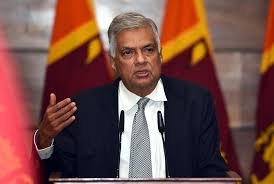Ranil Wickremesinghe Arrested in Sri Lanka Fund Misuse Case
In a historic and dramatic development that has sent shockwaves through the political landscape of the island nation, former President Ranil Wickremesinghe has been formally arrested by Sri Lankan authorities. The arrest, confirmed by police, is in connection with a serious investigation into the alleged misuse of state funds during his tenure as the country’s leader. This event marks an unprecedented moment in Sri Lanka’s history, as Ranil Wickremesinghe becomes the first former president of the nation to be taken into custody, signaling a potent shift in accountability and judicial proceedings for high-ranking officials.
The specific charges facing the veteran politician, who has been a central figure in Sri Lankan governance for decades, are directly related to a series of foreign trips he undertook while serving as president from 2022 to 2024. According to reports from authorities, he faces three distinct charges concerning these journeys. The case that precipitated Friday’s arrest specifically revolves around a stopover made in the United Kingdom in 2023. Officials allege that after attending the G77 summit in Cuba, Ranil Wickremesinghe and his wife used state funds to finance a private visit to attend a graduation ceremony at the University of Wolverhampton, a claim the former president has consistently and firmly denied. The Criminal Investigations Department (CID), which had been probing the matter since a court referral in June, estimates that his 23 presidential trips cost the state over Rs 600 million, making the scrutiny of their purpose a matter of significant public interest.
The arrest of Ranil Wickremesinghe adds a complex layer to his already storied and tumultuous political career. He ascended to the presidency under extraordinarily difficult circumstances, stepping into the role after a devastating economic crisis sparked a massive popular uprising that forced his predecessor, Gotabaya Rajapaksa, to flee the country. Despite leading a party with barely any parliamentary presence, Ranil Wickremesinghe was widely credited by international observers and economic analysts with implementing tough but necessary reforms that began to steer Sri Lanka back from the brink of total collapse and onto a fragile path toward economic recovery. His long political journey includes six separate terms as Prime Minister dating back to the 1990s, a testament to his resilience and strategic acumen in the often volatile world of Sri Lankan politics. A lawyer from an influential family, he first entered parliament in 1977 and later worked to reform his United National Party (UNP) by combating corruption within its ranks. His arrest following his recent electoral loss to Anura Kumara Dissanayake closes a remarkable chapter, underscoring the intense scrutiny and legal challenges that often follow political power.
Go To Main Page

